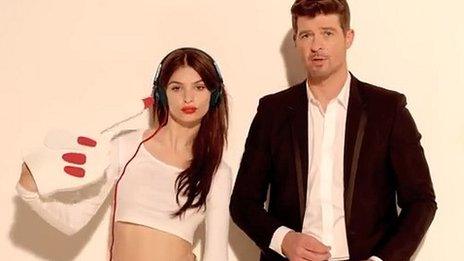Childish Gambino and five other controversial music videos
- Published
Why Childish Gambino has people talking
Childish Gambino's This is America exploded into the world on Saturday and already has about 50 million hits under its belt.
If you've seen it yet (and if you've not, you should) you'll know why it's proving controversial.
Powerful and graphic in equal measure, it stuns with the amount of violence - which includes Gambino executing a man before gunning down a gospel choir.
It's generally being praised rather than condemned, despite the stark imagery and bloodshed.
Other controversial videos have, in the past, not been received quite so well. Scroll down for more.
(Due to their controversy, we're not linking to some of the actual videos.)

Robin Thicke - Blurred Lines
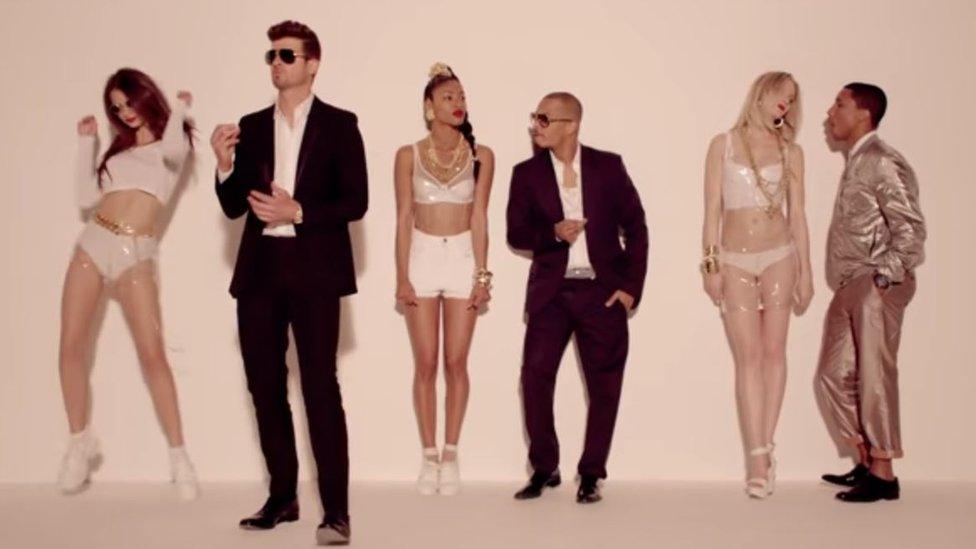
Spot the difference between the men's and women's clothing
Remind me...?
Cast your mind back to the heady days of 2013 and those long months when you couldn't go anywhere without hearing the insistent thrum of Blurred Lines, with Robin Thicke telling you: "I know you want it." The song itself was seen as problematic but the video proved equally divisive.
Why was it controversial?
Other than those lyrics, many had an issue with the fact the video shows women with hardly any clothes on - while the men (Thicke, Pharrell and TI) were all fully suited up. There's an unrated version where the women, including Emily Ratajkowski who's now better known as an actress, are totally nude. It alludes to bestiality and drug use. The video also sees the female dancers use slightly random things as props - like a string of sausages - and caress Thicke's face with their feet.
What happened?
The unrated video got banned from YouTube at the time, but can now be seen again there. Thicke said in an interview with GQ, external that they intended "to do everything that was taboo... everything that is completely derogatory towards women" and that they wanted to "be as brash and fearless as possible". He said the nudity wasn't meant to be taken seriously but have more "Benny Hill type stuff". The song itself was banned from several university unions.

Madonna - Like a Prayer
Allow YouTube content?
This article contains content provided by Google YouTube. We ask for your permission before anything is loaded, as they may be using cookies and other technologies. You may want to read Google’s cookie policy, external and privacy policy, external before accepting. To view this content choose ‘accept and continue’.
Remind me...?
Religion and fashion don't always mix - look at last weekend's Met Ball, which some people have been unhappy about because its theme was "fashion and the Catholic imagination". But Madonna (of course) got there first with 1989's Like a Prayer (which, incidentally, she also performed at the Met ball).
Why was it controversial?
Madonna escapes to a church after seeing a woman brutally attacked by white supremacists and a black man wrongly arrested for her murder. While she's in there, she's kissed by a black saint/Jesus figure who comes to life. And when she cuts her hand on his knife, the wounds on her hands look like stigmata. Burning crosses are also seen - a practice associated with the Klu Klux Klan.
What happened?
Pepsi decided to retract a multimillion dollar ad campaign which was meant to use the song because there was such an outcry over the music video. It was banned by Italian TV and the Vatican described it as blasphemy. The video's director Mary Lambert told Rolling Stone, external: "The most important thing was to force people to reimagine their visual references and really root out their prejudices... I wanted to speak about ecstasy and to show the relationship between sexual and religious ecstasy."

Erykah Badu - Window Seat
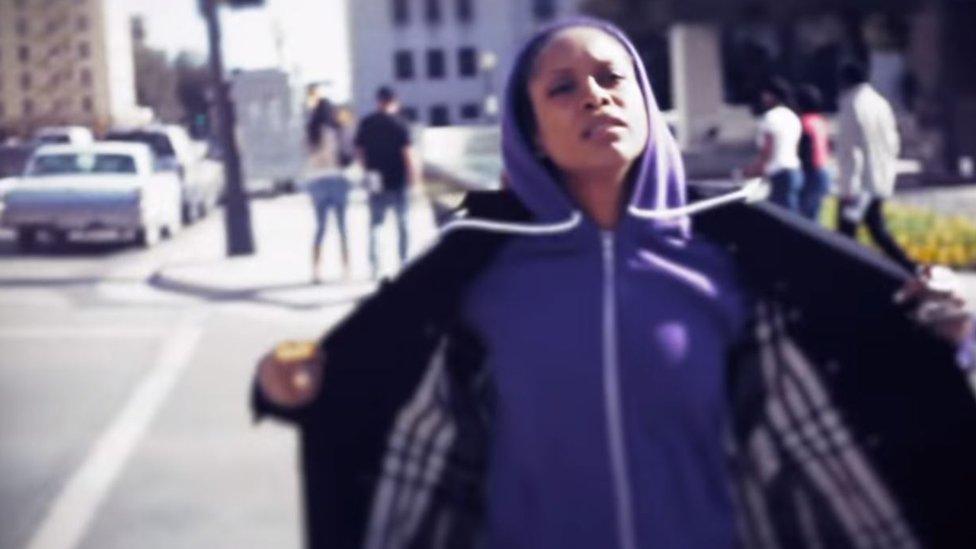
Remind me...?
The video for the lead single from Badu's album New Amerykah Part Two (Return of the Ankh) was filmed in March 2010. Badu tweeted that it was filmed "guerrilla style, no crew, 1 take, no closed set, no warning" in just two minutes, in the Dealey Plaza district of Dallas, Texas.
Why was it controversial?
Badu is wearing a purple hoodie and joggers at the start of the video, before she starts gradually disrobing, tossing her clothes onto the street as she walks and jogs along. At the end of the clip, when she is naked (though this is pixelated), she is shot dead - the word "groupthink" seen spooling from her head. She's since described this as being "character assassination" that she specifically wanted to be linked to the assassination of JFK which had taken place in the same district.
What happened?
City officials in Dallas weren't best impressed - neither by her nudity, or the fact she didn't have a permit to film. Badu was charged with disorderly conduct for public nudity and fined $500 (£368). But she has said she did not intend to disrespect Kennedy, describing him as one of her heroes.

MIA - Born Free
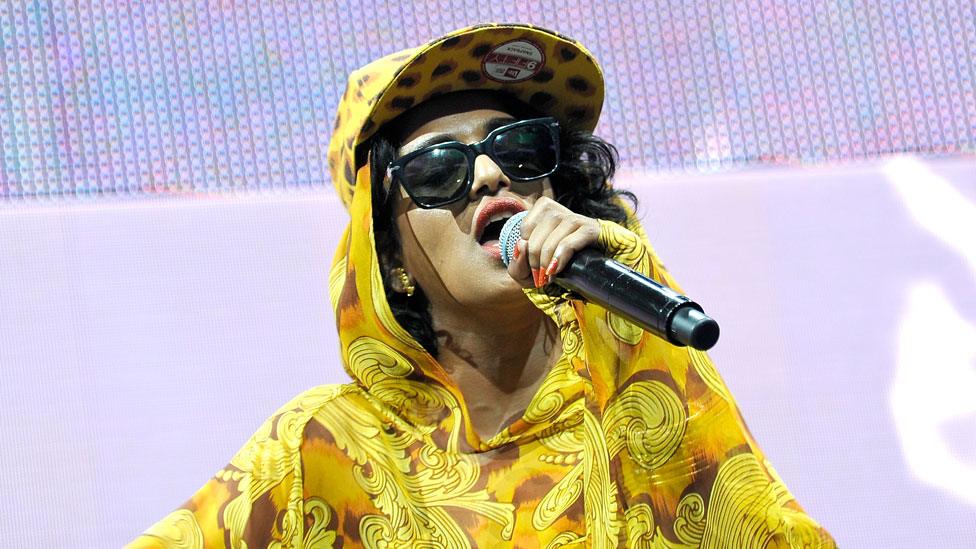
Remind me...?
MIA's music video is actually a nine-minute short film, which was directed by Romain Gavras and written by the singer herself. It came out just two weeks after Window Seat (above).
Why was it controversial?
The (very violent) video sees those with red hair standing in for other ethnic minorities who are being persecuted. It depicts red-haired men and boys being rounded up by SWAT teams before being forced to run across a live mine field - one young boy is shot in the head and another hits a mine, both events graphically shown in the clip.
In The Guardian, Douglas Haddow said, external Born Free showed "that we have become so numb to the imagery of political violence that genocide can now be parodied in order to promote a pop record."
What happened?
The video was removed from YouTube for being graphic. But among those defending it was the 12-year-old shown being shot, who told the NME, external that MIA was "trying to show violence to end violence".

Kanye West - Famous
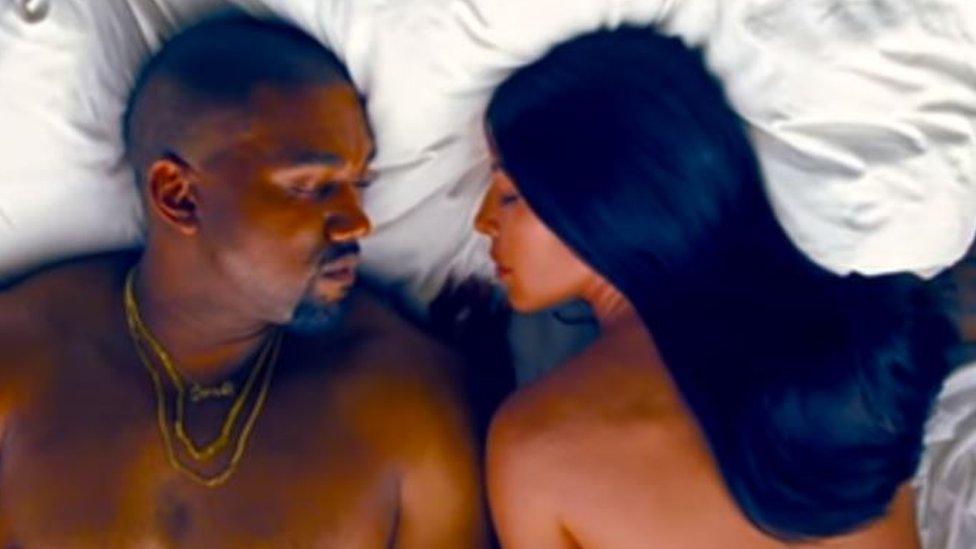
West and Kardashian West as depicted in the clip
Remind me..?
Mr West is no stranger to controversy. This is the 2016 song that references his feud with Taylor Swift, with (expletive) lyrics claiming he made her famous and that he feels they "might still have sex".
Why was it controversial?
The clip for Famous shows nudity - rather a lot of nudity, and all of the likenesses of a lot of famous people who are all apparently in a huge bed together. They include Kanye (next to Taylor, classy), his wife Kim Kardashian West, her ex-boyfriend Ray J, Caitlyn Jenner (who used to be married to Kim's mum Kris) and Kanye's ex Amber Rose. Donald Trump is in there too, as is Rihanna. While the men's genitals are covered up, nearly all of the women are seen topless.
What happened?
The video was criticised for showing people as being naked, without their consent. Lena Dunham wrote a comment on it on Facebook, saying: "Now I have to see the prone, unconscious, waxy videos of famous women? It gives me such a sickening sense of dis-ease."
But Kanye, speaking to Vanity Fair, external, said he made sure to take out any shots that had a sexual undertone. And his celebrity friends who didn't appear in the video? They all asked why they weren't in the bed.

Follow us on Facebook, external, on Twitter @BBCNewsEnts, external, or on Instagram at bbcnewsents, external. If you have a story suggestion email entertainment.news@bbc.co.uk, external.
- Published6 May 2018
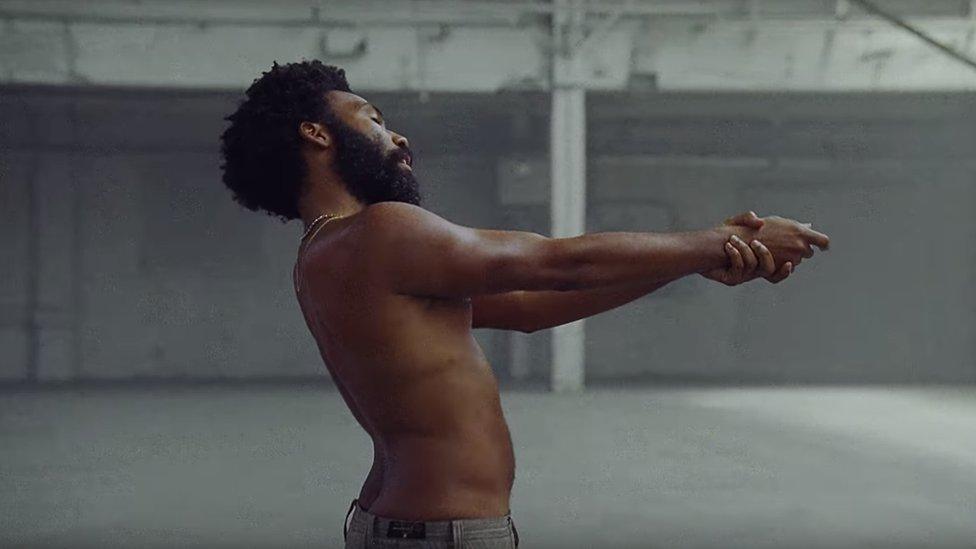
- Published8 May 2018
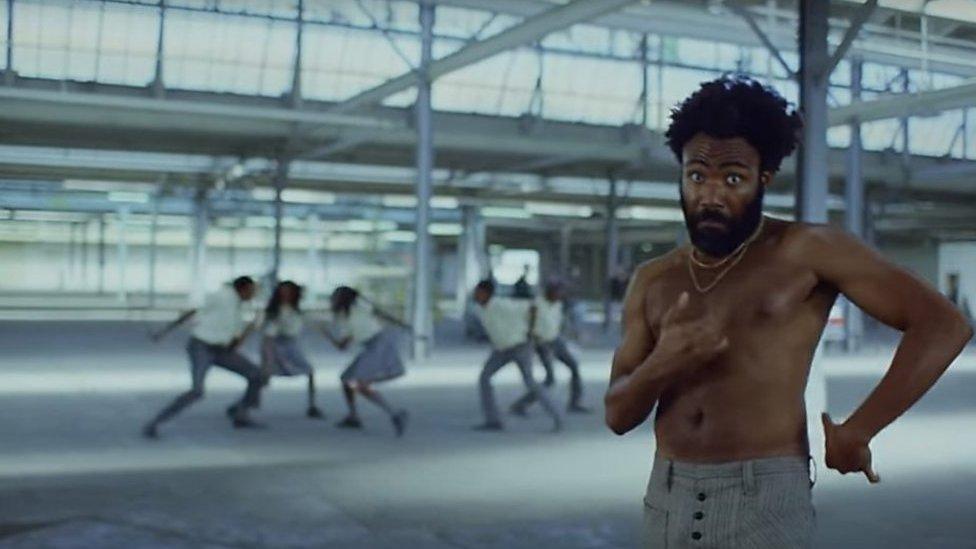
- Published9 October 2013
